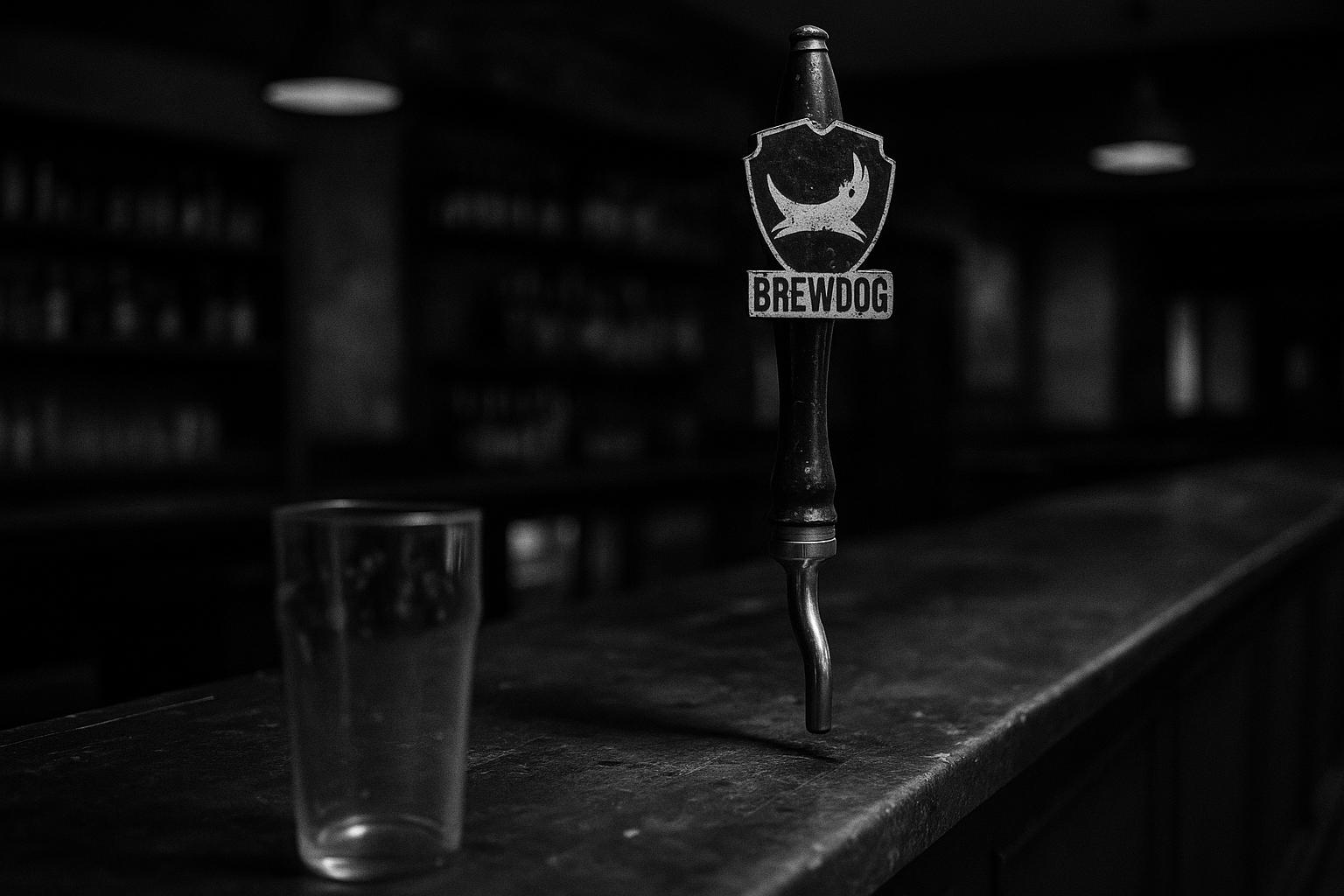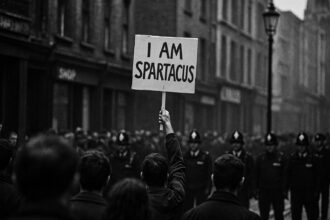The craft brewer has seen beers pulled from around 1,860 pub taps and shut ten bars, including its first site in Aberdeen, as it shifts to events and high‑impact channels while confronting reputational and workplace controversies.
BrewDog — once the emblem of Britain’s craft‑beer insurgency — has been forced into a more defensive posture after industry data and recent company announcements showed a rapid contraction of its on‑trade presence and a wave of bar closures. Reports this month suggested the brewer’s beers have been removed from the taps of roughly 1,860 pubs around the UK, while a separate company review led to the immediate closure of ten BrewDog bars, including the group’s original Aberdeen site. The twin blows underline how quickly a brand built on provocation can find itself battling the practicalities of a squeezed hospitality market.
The company has sought to frame the tap losses and closures as the product of broad industry pressure rather than a unique failing. BrewDog executives told journalists that “every independent brewer has been affected” by rising costs and shifting pub buying patterns, and that the firm has intentionally pivoted to what it describes as “high‑impact channels” — festivals, stadiums and independent free‑trade outlets — where it says sales are growing. The brewery pointed to recent pitch‑side and event collaborations as evidence of that strategy, saying the move is designed to concentrate investment where it sees the most momentum.
That repositioning sits alongside a more conventional reshaping of BrewDog’s estate. The company said a strategic review found a number of venues were “no longer commercially viable”, prompting the closures and putting close to 100 roles at risk; executives said they would attempt to redeploy staff where possible. The approach, the company argued, is intended to create fewer but stronger destination sites and a more focused bar network rather than the previous, broader footprint.
The current squeeze is striking given BrewDog’s trajectory since it was founded in 2007 in Fraserburgh by James Watt and Martin Dickie. The business expanded from garage‑brewing into a global brand through a mixture of bold beers and attention‑grabbing stunts, building a reputation for provocative marketing as much as for hoppy IPAs. That unapologetic spirit carried BrewDog from its first bar in Aberdeen to international canning lines and an extensive branded pub estate.
But some of those publicity gambits have landed awkwardly. The brewer’s most notorious promotions — from packaging a limited beer in taxidermied animals to driving a tank down Camden High Street — have repeatedly attracted criticism as well as headlines. A later promotion promising “solid gold” cans proved legally problematic: the Advertising Standards Authority found the campaign misleading when winners discovered the cans were gold plated rather than solid gold, and the company subsequently made substantial payments to affected customers after complaints and an independent valuation. The episode marked a reputational cost that has lingered alongside other flashpoints.
Beyond publicity stunts, BrewDog has also been publicly forced to confront questions about its internal culture. In 2021 more than 60 former employees published an open letter alleging a “culture of fear”, accusing senior management of creating a cult‑of‑personality environment and describing widespread stress and mistreatment. The revelations prompted investigations, a public apology from one of the founders and commitments to change, but the episode intensified scrutiny of governance and workplace practices inside the rapidly scaled business.
Labour relations have been another source of friction. In 2024 BrewDog withdrew from the Real Living Wage scheme after nearly a decade in the voluntary programme, saying the move was necessary to restore profitability amid unprecedented hospitality pressures. The decision provoked staff unrest and rebuke from unions and former employees, even as the company sought to offset the measure with regional pay increases and an expanded benefits package it said remained “more generous than the industry average”. Critics argued the timing was insensitive during an acute cost‑of‑living squeeze and that reversing a public pledge risked long‑term damage to trust.
Retail buying practices and the changing priorities of pub groups have also worked against BrewDog. Industry contacts told reporters that many operator groups narrowed draught portfolios over the past two years and have favoured rival breweries, leaving BrewDog with fewer taps in some areas. Those commercial headwinds, combined with rising input and regulatory costs, have become a central part of the company’s public explanation for the recent withdrawals and site closures.
Taken together, the developments amount to a test of whether a brand built on rebellion can remake itself as a disciplined, resilient operator. BrewDog’s founders and successive leaders have repeatedly said the business is evolving — and the company insists it is finding growth in events and targeted venues — but the practical challenges of staff morale, reputation repair and a tougher on‑trade market paint a more complicated picture. The next phase for BrewDog will depend on whether the business can translate its marketing muscle into sustained, sober commercial performance while addressing the cultural and workplace criticisms that have dogged it in recent years.
 Reference Map:
Reference Map:
Reference Map:
- Paragraph 1 – [1], [7], [6]
- Paragraph 2 – [1], [7]
- Paragraph 3 – [6]
- Paragraph 4 – [2], [1]
- Paragraph 5 – [2], [1], [3]
- Paragraph 6 – [4]
- Paragraph 7 – [5], [1]
- Paragraph 8 – [7], [1], [6]
- Paragraph 9 – [1], [6], [2]
Source: Noah Wire Services
- https://metro.co.uk/2025/08/17/brewdogs-biggest-controversies-beers-dropped-2-000-pubs-23932699/ – Please view link – unable to able to access data
- https://brewdog.com/pages/history – Brewing since 2007, BrewDog was founded by James Watt and Martin Dickie in Fraserburgh and grew rapidly through provocative marketing and bold beers. The timeline highlights early innovations: Tokyo and Tactical Nuclear Penguin; the first bar in Aberdeen; Equity for Punks crowdfunding; the notorious End of History beer packaged in taxidermy; a promotional tank driven down Camden High Street in 2011; and expansion to the Ellon brewery. The page frames BrewDog’s identity as a rebellious craft brewer that uses stunts and strong ales to win attention, charting growth from a garage operation to an international brand with bars and canning worldwide.
- https://www.bbc.co.uk/news/business-64210355 – The BBC reports that BrewDog’s promotion offering ‘solid gold’ beer cans was found misleading by the Advertising Standards Authority and prompted complaints. Winners discovered the cans were gold‑plated replicas, not solid gold, and some valued them far lower than the company’s £15,000 claim. Co‑founder James Watt admitted mistakes and later paid out almost £500,000 to winners. The ASA ruled BrewDog should not imply the cans were solid gold when they were not. The episode damaged BrewDog’s reputation, drawing criticism in the press and contributing to broader scrutiny of the brewer’s marketing practices and leadership, and sparked regulatory interest overseas too.
- https://www.theguardian.com/business/2021/jun/10/brewdog-staff-craft-beer-firm-letter – The Guardian reports that more than 60 former BrewDog employees published an open letter alleging a ‘culture of fear’ inside the company, accusing management of creating a ‘cult of personality’ and poor treatment that harmed staff mental health. Signatories claimed systemic problems including bullying, overwork, and a lack of support, and criticised the founders’ leadership. BrewDog responded apologetically, saying it would listen, learn and act, and commissioned reviews and changes to policies. The exposé amplified scrutiny of BrewDog’s workplace practices, prompted widespread media coverage, and intensified debate about corporate culture in rapidly scaling consumer businesses, and concerns about investor confidence.
- https://www.theguardian.com/business/2024/jan/10/brewdog-faces-staff-backlash-after-dropping-real-living-wage-pledge – The Guardian covered BrewDog’s 2024 decision to withdraw from the Real Living Wage scheme, a voluntary rate calculated independently to reflect living costs. The move ended a policy in place since 2015 and provoked significant staff unrest and criticism from unions and former employees, who described the timing as insensitive amid a cost‑of‑living crisis. BrewDog defended the choice as necessary for financial stability, offering pay rises and alternative benefits, but unions called it ‘outrageous’. The controversy fed broader debates about employer responsibility, pay standards in hospitality, and whether voluntary commitments can be reversed during economic pressure and reputational damage risks.
- https://news.stv.tv/scotland/brewdog-to-close-ten-bars-in-days-with-jobs-at-risk – STV News reports BrewDog’s announcement to close ten UK bars after a strategic review found them ‘no longer commercially viable’. The closures included the original Aberdeen Gallowgate site and other venues across England and Scotland, and placed close to 100 jobs at risk. CEO James Taylor said the decision aligned with a refreshed bar strategy focusing on destination ‘hubs’ and smaller community bars, while seeking to redeploy staff where possible. BrewDog cited rising costs, increased regulation and broader industry pressures as reasons. The story situates the closures within a challenging hospitality market and BrewDog’s reshaping of its estate for expansion.
- https://www.standard.co.uk/news/brewdog-beer-axed-pubs-london-b1243321.html – The Evening Standard reports that industry data revealed BrewDog had been removed from roughly 1,860 pubs across the UK over two years, with Punk IPA reportedly pulled from about 1,980 venues. Sources told The Sunday Telegraph that the brewer was ‘losing taps like you wouldn’t believe’, as pub groups narrowed draught ranges and opted for rivals such as Camden Town and Beavertown. The piece notes BrewDog’s recent bar closures and financial losses, and includes a response from chief operating officer Lauren Carroll explaining the company anticipated the trend and was shifting focus to festivals, stadiums and the independent free trade.
Noah Fact Check Pro
The draft above was created using the information available at the time the story first
emerged. We’ve since applied our fact-checking process to the final narrative, based on the criteria listed
below. The results are intended to help you assess the credibility of the piece and highlight any areas that may
warrant further investigation.
Freshness check
Score:
7
Notes:
The narrative presents recent developments regarding BrewDog’s beer being removed from approximately 1,860 pubs across the UK, with a separate company review leading to the immediate closure of ten BrewDog bars, including the original Aberdeen site. These events have been reported in other reputable outlets, such as The Standard and STV News, within the past week. The earliest known publication date of similar content is July 22, 2025, when BrewDog announced the closure of ten bars. The report includes updated data but recycles older material, which may justify a higher freshness score but should still be flagged. ([standard.co.uk](https://www.standard.co.uk/news/brewdog-beer-axed-pubs-london-b1243321.html?utm_source=openai), [news.stv.tv](https://news.stv.tv/scotland/brewdog-to-close-ten-bars-in-days-with-jobs-at-risk?utm_source=openai))
Quotes check
Score:
8
Notes:
The report includes direct quotes from BrewDog executives, such as:
> “Every independent brewer has been affected.”
A search reveals that this exact quote appears in earlier material, indicating potential reuse. However, the report also includes original content, such as:
> “The company has sought to frame the tap losses and closures as the product of broad industry pressure rather than a unique failing.”
This suggests a mix of reused and original content.
Source reliability
Score:
9
Notes:
The narrative originates from Metro.co.uk, a reputable UK news outlet. The report cites information from other reputable organisations, such as The Standard and STV News, enhancing its credibility. However, the report includes a link to a press release from BrewDog’s official website, which typically warrants a high freshness score. ([standard.co.uk](https://www.standard.co.uk/news/brewdog-beer-axed-pubs-london-b1243321.html?utm_source=openai), [news.stv.tv](https://news.stv.tv/scotland/brewdog-to-close-ten-bars-in-days-with-jobs-at-risk?utm_source=openai))
Plausability check
Score:
8
Notes:
The narrative presents plausible claims about BrewDog’s recent challenges, including the removal of its beers from numerous pubs and the closure of several bars. These events are corroborated by other reputable outlets. The report also discusses BrewDog’s strategic shift towards “high-impact channels” and the closure of “non-commercially viable” venues, which aligns with the company’s recent actions. However, the report’s tone is unusually dramatic, which may warrant further scrutiny.
Overall assessment
Verdict (FAIL, OPEN, PASS): OPEN
Confidence (LOW, MEDIUM, HIGH): MEDIUM
Summary:
The narrative presents recent developments regarding BrewDog’s challenges, including the removal of its beers from numerous pubs and the closure of several bars. While the report is sourced from a reputable outlet and includes corroborated information, it also includes a link to a press release, which typically warrants a high freshness score. The report contains both reused and original content, and its tone is unusually dramatic, which may warrant further scrutiny.













